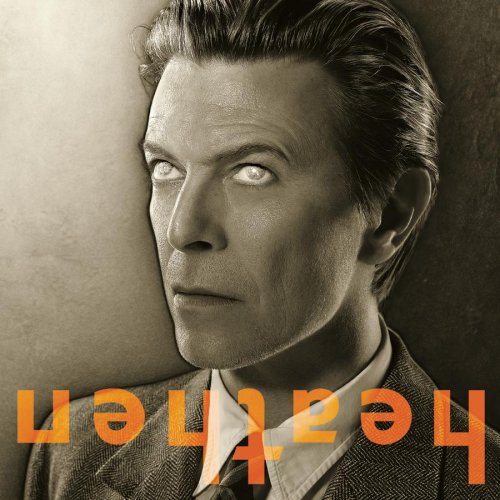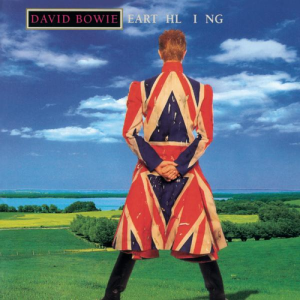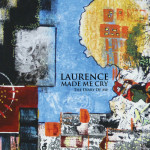As we reach the end of our month long celebration and purview of David Bowie, it’s time for the final part in my exhaustive perusal through all of the thin white duke’s studio albums. We last left our polymath composing a post L.A riots opus in 1993 with Black Tie White Noise, part IV begins with that year’s other release, The Buddha Of Suburbia.

The Buddha Of Suburbia (Arista) 1993
A curious if not odd (even for ‘the man who fell to Earth’) release, recorded during the interim that followed Tin Machine’s demise, The Buddha Of Suburbia initially began life as an unburdened soundtrack for the BBC 2 adaptation of Hanif Kureishi’s novel.
The second of two albums, both released during 1993 (the other being Black Tie White Noise), the original accompaniment to ‘the escape from the suburbs’ series was reworked by Bowie and fashioned into the now familiar adumbrate version. Only the title track remains unchanged, the rest of the material expanded or completely rewritten.
Largely ignored at the time, the ‘queer’ album features an unapologetic array of loose experimental soundscapes, sketches and singles, many of which reference or riff on ‘golden years’ Bowie. In a poised if not highly reflective mood, our host integrates melodies and themes (namely mental illness) from Space Oddity and ‘All The Madmen’ (on the eponymous title track) through to Low (‘The Mysteries’).
Once again reunited with the flourishing and graceful pianist, Mike Garson, and his backseat partner, Erdal Kizilçay, the ‘lad insane’ was returning to a semblance of his former glory. Phaser affected, aloof denunciations (‘Sex And The Church’), Siesta era Miles Davis, elegiac Spanish bebop (‘South Horizon’) and nuanced pop (‘Untitled No.1’) sits pretty, as Bowie signals the arrival in two-years of 1.Outside. In fact one of the leading lamented pop anthems from Buddha, ‘Strangers When We Meet’, was re-recorded and re-released only months after the conceptual art crime opus.
Decreed as the leading highlights of the album by the majority –
Buddha Of Suburbia (single), Strangers When We Meet (singles)
Pay attention to those often overlooked beauties –
South Horizon, The Mysteries
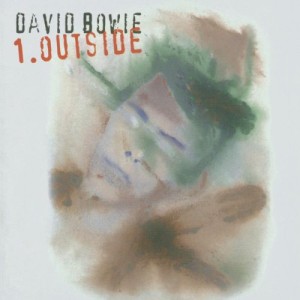
1.Outside (Arista/BMG) 1995
With ‘five years’ remaining until the new millennium, Bowie, tapping into the anxiety and quest for spiritual relief, returned to his first passion, art.
Back with his most innovative collaborator, Brian Eno, he dredged the bottomless pit of morose and despair. Dreaming up a morbid tale of future sacrificial performance art, gone wild, and taboo breaking cybernetics, he narrated a woeful diegesis through a series of ‘verbasier programmed’ characters.
Disturbing to say the least, our ‘cracked actor’ pitches an avant-garde ‘whodunnit?’, set in a parallel bleak world, where the self-mutilated gestures of Günter Brus (the patriarchal figurehead of body art) and ‘the orgiastic mystery theatre’ of Hermann Nitsch have been taken to new, hyper, extremes of blood-letting.
Led by the investigative diary of art crime detective Nathan Adler, a cryptic cut-up of Burroughs/Burgess language is used to not just explain the circumstances that befell the poor victim, Baby Grace, but also delve into the collective psyche.
Out on a limb musically, Bowie’s home life may have been content, yet something suddenly propelled him to bravely create a depressive requiem. Easily the best, if not most original, material since Scary Monsters, 1.Outside was entirely written in the studio, as the band extemporised: motivated by Eno’s synonymous oblique strategy cards.
Scott Walker lost in cyberspace; the industrial melancholy is at its most anguished on ‘A Small Plot Of Land’ (a version was used on the, Bowie as Warhol starring, tragic biopic of Basquiat, directed by Julian Schnabel), yet a more reved-up, pummelling bombastic variant is used on ‘Hallo Spaceboy’ and ‘The Heart’s Filthy Lesson’ (perfectly playing out David Fincher’s Seven).
Leaving many fans bemused (as I myself witnessed on the Outside tour, the baying audience pleading for the greatest hits package), the philosophical snuff opus seemed puzzling to those familiar with the pop-lite Bowie. Thankfully Bowie cut loose the shackles of commerciality for a contemporary blast of shock and dread.
Decreed as the leading highlights of the album by the majority –
The Heart’s Filthy Lesson (single), Hallo Spaceboy (single), We Prick You
Pay attention to those often overlooked beauties –
A Small Plot Of Land, The Voyeur Of Utter Destruction, I’m Deranged
Earthling (BMG) 1997
Remarkably even though these were the halcyon days of guitar-band driven, and nostalgic, Britpop, dance music, predominantly drum ‘n’ bass, was also basking in the glow. Thanks in some small part to the crossover success of the movement’s big players, Goldie and Roni Size.
Plucking objectively from his orbit of influences, Bowie adopted the drum ‘n’ bass principles for a dynamic, steely ‘textural diary’, both discordant, but surprisingly melodic and erudite.
Embracing technology with gusto, Earthling would be digitally recorded, though all the skittish drum loops and bass lines would be performed live first before being cut-up to fit around Bowie’s arrangements at a later date.
Recorded on the cusp of a great change politically, Earthling’s concerns and observational objections were written before the tidal change in UK government. However those postulations, from an artist living aboard in New York, spoke more about America, all to be exact, its foreign policy, both militarily and culturally. ‘Dead Man Walking’, taken from death row, and the sardonic, harsh rebuke, ‘I’m Afraid Of Americans’ (originally recorded for 1.Outside with Eno) alluded to the polymath’s discomfort with that adopted home; especially the ‘McDonalds’ effect of capitalist colonialism.
Of curse, standing like the bulldog spirited equivalent of a figure from Caspar David Friedrich’s nationalistic, landscape paintings, Bowie with his back to the audience gazes out onto the green and pleasant English countryside: his natural embryonic home. Wearing an Alexander McQueen designed (cool Britannia ruled the waves after all) Union Jack coat, Bowie’s frayed and battered garment is a sad reflection of the exuberant excitement of Pete Townshend’s heady mod era version.
Appropriating the Prodigy and Underworld, and fashioning veiled, nuanced auguries on ‘Battle Of Britain (The Letter)’, his heart still belongs to Blighty.
Almost without a blemish, the album is Bowie’s most accomplished and challenging work, alongside Outside. It would however mark a slow decadence into a more smoother, mature sound that would guide the artist through the late 90s and into the noughties.
Decreed as the leading highlights of the album by the majority –
Little Wonder (single), Battle Of Britain (The Letter), Dead Man Walking (single), I’m Afraid Of Americans (single)
Pay attention to those often overlooked beauties –
Looking For Satellites, Seven Years In Tibet

Hours… (Virgin) 1999
Cradled in the youthful luminosity of a ‘born again’, flowing locks, Bowie, his damaged enervated Earthling self, lies exhausted. Its purpose served, Earthling’s probing dynamism and confrontational cyber style attack was toned down for a softer, meditative approach, on the eve of a new millennium.
Facing the tides of change and his own mortality, Bowie sought solace from the back catalogue (an exercise repeated recently on The Next Day).
Wallowing in a self-pitted state of pained irreverence; the gentler incarnation was separated into the roles of mature, downcast, romantic and internet crusader: a spirit of collaboration with fans via his personal BowieNet hub, called for lyrical inspiration, the lucky winner’s contribution appearing on ‘What’s Really Happening’.
The lion’s share of the Hours… set list was recycled from a soundtrack that both Bowie and his tenure sparring partner Reeves Gabrels had composed for future dystopian online game, Omikron – The Nomad Soul. Surprisingly this material was quite commercial and light, though that sophisticated ‘Trojan horse’ method of making melancholic and sad themes palatable, worked extremely well on the paean to aging and lovelorn memories, ‘Thursday’s Child’. A congruous series of laments follow suit, with wistful, weeping guitar laden forlorn ditties such as ‘Something In The Air’ and ‘Survive’.
Appropriating his own earlier work, the mooning Americana twanged malady ‘I’m Dreaming My Life’ and gnarling stutter riff ‘The Pretty Things Are Going To Hell’ (referencing The Stooges ‘Your Pretty Face Is Going To Hell’), sound like lost Tin Machine recordings, whilst stirring vignette ‘Brilliant Adventure’, sounds like a passage of contemplative spiritualism from the ‘Moss Garden’ of Heroes.
Playing it safe – though a punctilious, methodical Bowie is better than no Bowie at all – our ersatz starman stuck to nostalgia.
Decreed as the leading highlights of the album by the majority –
Thursday’s Child (single), Seven (single), The Pretty Things Are Going To Hell (single)
Pay attention to those often overlooked beauties –
Something In The Air, Brilliant Adventure
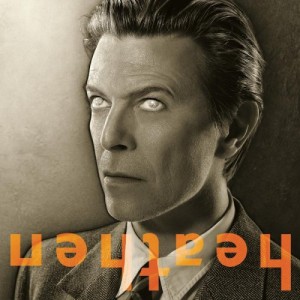
Heathen (ISO/Columbia) 2002
Despite the commentators and critic’s attempts to project their own neurosis of emptiness upon the post 9/11 Heathen, Bowie insisted that he had no intention of directly addressing that momentous event. Of course it’s inconceivable that the Twin Towers of doom couldn’t have dented or made an impact on his psyche, after all he lived there.
But most of the material had already been recorded prior to this, with songs taken from his nostalgic Pin Ups for the twenty first century, Toy album: a reworking of lesser known ditties, blue eyed soul and vaudeville from the mid 60s to early 70s, which included ‘In The Heat Of The Morning’, ‘Conversation Piece’ and even the old Davy Jones and The Lower Third single, ‘You’ve Got A Habit’.
Never officially released, this saccharine, rose-tinted look back to fonder, innocent times was another attempt by Bowie to wallow in the past. The anxiety of a new millennium, ‘degradation of mankind’ and basic need for meaning prompted our troubled polymath to write some elegiac and emotional laments; his best for a number of years. In part the return of Tony Visconti as co-producer, spurred Bowie on to once again push the envelope, though Heathen was still only a moderate shadow of the bolder RCA epoch.
Visconti’s gilded production values nudged the ambient lilting washes, attentive horns, tender strings and vapour trail effects in the right direction.
Hardly lacking culture or principles, Bowie’s Heathen appellation rings truer to the word’s other meaning, ‘a person who doesn’t belong to a widely held religion.’ In a manner the plaintive and layered lyrics fumble in a vacuum of confusion, cast adrift of answers and spiritualism.
The album begins well, with the opening theatric, hallowed synth requiem of ‘Sunday’; a glimmer of the nuanced quality found back in the 70s.
The Pixies (‘Cactus’) and UFOddity, Norman Carl Odam (the spark for Ziggy Stardust), supply the covers, the last of those stardust cowboy voyages into the ether, ‘I Took A Trip On A Gemini Spaceship’, given a real ham performance.
Surprisingly the stirring waltz like weepy to memories, ‘Slip Away’ (originally earmarked for Toy, under the title of ‘Uncle Floyd’) has an air of Chrissie Hynde about it, especially in the bridge’s melody.
A reunion with Pete Townshend (last heard contributing to ‘Because You’re Young’ from Scary Monsters) on the understated, but melodically sweet, ‘Slow Burn’ takes time to disrobe its charms, whereas the glib addition of David Grohl’s unmemorable guitar waffle on Neil Young’s 1968 paean, ‘I’ve Been Waiting For You’, seems a populist stab at endearing Bowie to the stadium rock crowd.
Progressively superior to Hours… in every way, the aching heart of Bowie awakened from lethargy, demanding a ‘better future’.
Decreed as the leading highlights of the album by the majority –
Cactus, Slip Away, Afraid, A Better Future, Everyone Say ‘Hi’ (single)
Pay attention to those often overlooked beauties –
Sunday, Slow Burn

Reality (ISO/Columbia) 2003
Making the most of his creative flow, Bowie’s next critically assiduous, soul-searching, suite would draw from the ‘oil well’ of despair. The hyper ‘reality’ that permeated throughout this sophisticated album reflected a woeful climate, specifically the unfolding drama in the Middle East.
Allusions to neocon diplomacy, nepotism of the most colonially threatening kind and the crescent of Islam are interspersed with more pining romanticized themes of loss.
Assembling a ‘dream team’, Bowie’s backing group once again swelled with the talents of Mike Garson (piano), Tony Visconti (production duties), Earl Slick (guitar) and Carlos Alomar (guitar) – both veterans of Young Americans. Slick and Visconti would of course go onto to form part of The Next Day recording hub.
That quality and old camaraderie proved every bit as tightly dynamic, Reality unequivocally the thin white duke’s best work since Earthlings.
Again, Bowie insists on appropriating or at least resorting to past endeavours, recalling Outside on his sardonic, hustled cover of Jonathan Richman’s ‘Pablo Picasso’; Tonight on the samba weepy ‘Days’; and Black Tie White Noise on the thinly veiled indicative Dick Cheney putdown, ‘Fall Dog Bombs The Moon’: Bowie at his bleakest; “The blackest of years that have no sound, no shape, no depth, no underground/What a dog!’
An augury of what was to follow in 2013, the thumping kickdrum, rollicking anthem ‘Never Get Old’ has a resounding statement of intent from the artist: “Never ever gonna get old!” In character he may be, but Bowie’s cry against mortality is a personal one, echoed in the present. Unfortunately bowing to the so-called market forces – regardless of artistic values and sanctimonious vitriol, he always had an eye for making dough – Bowie lent the tune to mineral water brand Vittel, appearing in an advert which has an uncanny resonance with the recent ‘The Stars (Are Out Tonight)’ video.
For various reasons outside his control, namely the poor sods heart attack, Bowie never got to produce another volume of reactionary post-millennium blues, until now. The Next Day, despite the decade-long absence from recording, picks up where Reality left off.
Decreed as the leading highlights of the album by the majority –
New Killer Star (single), Pablo Picasso, Never Get Old (single), Reality
Pay attention to those often overlooked beauties –
She’ll Drive The Big Car, Try Some Buy Some
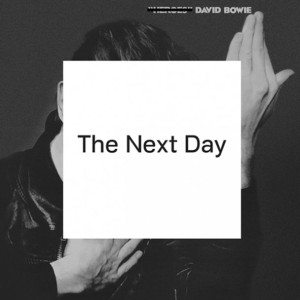
The Next Day (ISO/Columbia) 2013
The Flaming Lips cheekily entitled a song ‘Is David Bowie Dying?’ last year, a glib reference to the constant chatter and conniption ‘concern’ that’s followed the ‘thin white pensioner’ around since his heart attack in 2004. Forget all the curatorships, appearances and guest spots, which Bowie has since carried out, many of us, have already talked him into an early grave.
Sure, The Next Day swells with morose reflections and speaks of mortality; after all he is a survivor, part of the fortunate baby boomer generation who rewrote the rules and played fast and loose with the establishment, yet now benefactors of a culture that still idolizes its stars in their dotage: The old order hanging on for dear life.
Perhaps we expect Brian Eno and Tony Visconti to still be around, but Iggy? This is the paradox, because despite the obvious iconic casualties who died in their Byronic youth, Bowie and his peers who dabbled just as much and dangerously, have made it: the aging winners, still relevant and still able to command the public’s attention.
Less an obituary, more a testament to endurance, this latest cryptic trove of unrequited loss, fame and choked back reminiscence is attributed to a cast of damaged and forlorn psyches: from a WWII veteran desert rat soldier to the protagonist of a High School shooting.
Appropriation of not just his own revered image – Jonathan Barnbrook subverts the iconic Heroes posed cover, referencing Bowie’s Berlin years, a constant theme throughout – but also his past musical glories, our contemplative host seems to be far too coy and aware of his own stature; the decade lay-off prompting Bowie to reintroduce us to the back catalogue as though we’d forgotten it.
Scrutinised to the nth degree, The Next Day’s real achievement is its secrecy and how with such a large cast of musicians and contributors that Bowie kept his two-year project under wraps in an, somnambulist endorsed, privacy-free Internet world.
Marketed in what first appeared as an almost caviler, ‘out-of-the-blue’, fashion the album’s precursor elegiac Berlin travelogue, ‘Where Are We Now?’, wept openly upon the public, followed by the musings on our contradictory relationship with celebratory, ‘The Stars (Are Out Tonight)’, both released without prior warning.
Bowie’s vessel, Visconti, has delivered news that there will be more material to come (I reckon an announcement by September on a new LP), though the master is adamant he will no longer tour, concentrating purely on recording for the foreseeable future at least. Taking a leaf out of his, arguably, biggest influence Scott Walker’s own imposed locked away method of making music, Bowie wishes to remain in a sort of remote exile, avoiding interviews, performances and public appearances, instead putting all his effort and belief into occasional musical edicts. Observing us from a distance, Bowie ponders from a relaxed state of privilege, amused at his own luck and survival.
Decreed as the leading highlights of the album by the majority –
The Stars (Are Out Tonight) (single), Where Are We Now (single), The Boss Of Me, Heat
Pay attention to those often overlooked beauties –
Valentine’s Day, If You Can See Me, Heat

